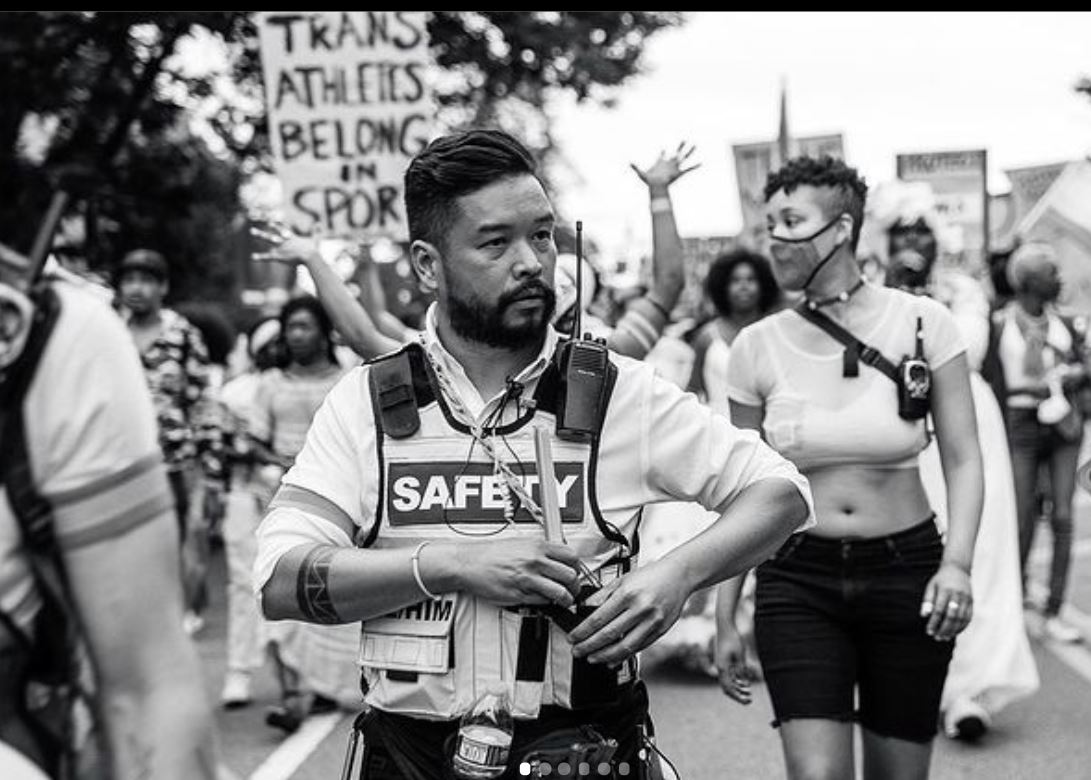The Brooklyn Liberation March: Youth and Gender-Based Unarmed Civilian Protection in New York City

Throughout the United States in 2021, Black Trans lives were under acute threat and attack. At the legislative level, more than 100 anti-trans bills were introduced in more than 30 states, and a total of 51 transgender people were murdered, most of whom were Black trans women living in the Southeast of the United States. While efforts to defend Black Lives gained momentum following the murder of George Floyd, such organizing often ignored the unique violence faced by trans individuals, both embedded in legislation, institutions, and interactions with law enforcement and motivating interpersonal attacks. Black trans individuals routinely report they feel unsafe; whether attending demonstrations or going about their daily lives, some describe existing “in a sense of survival mode.”
In 2020, the first Brooklyn Liberation March was a historic gathering of New Yorkers to protect Black Trans Lives. A total of 15,000 people attended, filling the streets with a silent demonstrative body dressed in white. In 2021, the organizers sought to provide a platform for Black trans youth to voice their experiences and asked the NP team in New York City to facilitate safety for a march and rally meant to call attention to this egregious violence and to #ProtectTransYouth.
Invitation to Run the Safety Team
Thanks to relationships and deep trust with organizers, NP began building a safety plan to address potential harms. The organizers requested safety infrastructure rooted in relationships rather than arms, and after a needs and threat assessment, unarmed civilian protection (UCP) was deemed a good fit. Drawing from protection experience at actions in the Twin Cities, the NP team mobilized a protective presence that could keep those most vulnerable safe from violence from state or non-state actors, with particular focus on the Black trans youth at the event.
With the help of NP staff and more than 100 volunteers, the action — which was attended by over 5,000 people — occurred free from significant violence, as well as free from arms and police intervention. The NP-led Safety Team demonstrated a commitment to UCP and the power of civilian protection that is for the community by the community, providing police monitoring and interlocution, interpositioning, and protective presence in the face of a number of reported and observed violent threats to youth safety.
Providing Holistic Protection
Several civilians external to the event approached the demonstrative body to aggress young protestors. NP staff and volunteers, thanks to their commitment to nonviolence and community care, used interpositioning and distraction to direct the aggressors away from the youth and march at large.
The Safety Team also provided protective presence to speakers and youth as they left the event, safely escorting them to subway stations or vehicles. At the conclusion of the event, one youth speaker featured at the rally turned down the NP safety team’s offer of protective accompaniment. As he and his girlfriend walked to the nearest subway station, a car pulled up and began harassing them with transphobic slurs and threats of violence. They quickly left the street corner and returned home safely; however, the incident was upsetting, and the fear lingered. The speaker shared this story with the NP team, noting that he hadn’t realized how unsafe he could be in New York City, an area he had previously perceived as a welcoming haven, and wished he had accepted the team’s offer.
Vehicular violence has become more frequent at protests and demonstrations throughout the U.S., with 139 recorded instances between May 2020 and September 2021. Marshal groups and safety teams around the country have been preparing for how to respond to such instances. When an aggressive driver drove through the frontline bike marshals and tried to drive into the frontline of the march, an NP Safety Team positioned themselves in front of the car. The external aggressor called over nearby New York police officers to intervene. One police officer accompanied the aggressor away from the bike marshals back to his vehicle, while NP safety team members provided a buffer through protective presence and interpositioning to prevent any direct interaction between the police, civilians, and the aggressor.
An Example of Community Care
The NP team’s presence at the Brooklyn Liberation March highlighted UCP’s efficacy for youth and gender-based protection. UCP, as a relational form of protection, is especially attuned to the unique threats and violence experienced by people marginalized by their gender or age—concerns and experiences that traditional armed approaches to security often overlook. Further, UCP’s focus on the primacy of local actors works to support and uplift the agency of those most impacted by violence. In the example of the Brooklyn Liberation March, it was the Black trans youth at the center of the event who were responsible for determining what they needed to feel safe and how the event could proceed accordingly.
The Brooklyn Liberation March is just one example of how UCP can support the safety of community events and celebrations. It represents one of many public events where Nonviolent Peaceforce Safety Teams have facilitated safety, providing holistic support to ensure that protesters and community members can exercise their rights free from violence and intimidation. Director of NPUS, Marna Anderson, shared: “The Brooklyn Liberation March was a really great example of showing people, showing the world, if you will, that we can have these large gatherings with thousands of people together. And we don’t have to have guns in order to keep people safe.” NPUS will continue to work with communities around the country to facilitate safety rooted in relationships and protection for those most vulnerable.
